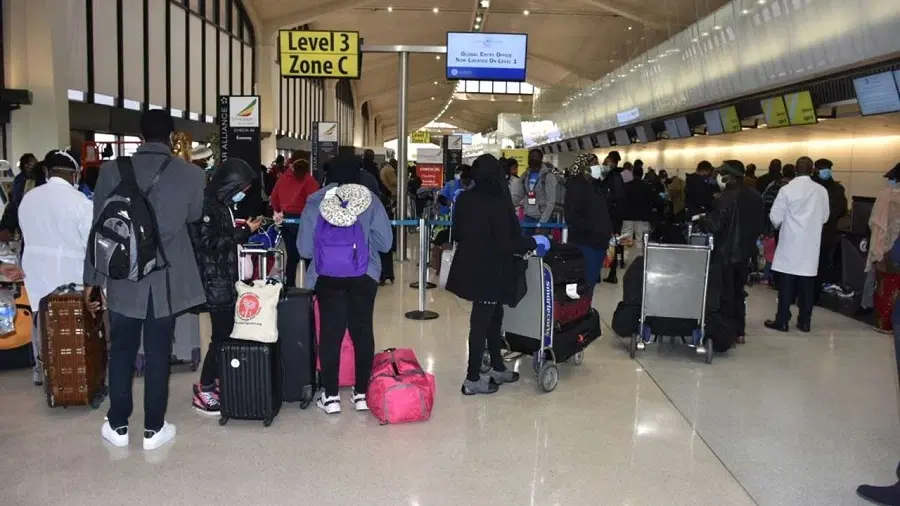TRAVEL

TOUGH TIMES: NIGERIANS SPEND 30% LESS ON TRIPS ABROAD
Amid soaring inflation and a sharply weakened Naira, Nigerians cut back on foreign air travel spending by 30% in 2024, amounting to $2.66 billion, down from $3.78 billion in 2022.
Aviation experts attribute this sharp decline primarily to the 244% depreciation of the Naira—from N450.71/$1 in early 2023 to N1,553.73/$1 in 2024—as well as surging inflation, which climbed from 21.34% in 2023 to 34.8% in 2024.
Additional factors include tougher immigration rules in developed countries and Nigeria’s exclusion from e-visa and visa-on-arrival programs, limiting the number of people looking to leave the country, or “japa.”
Data obtained from the Central Bank of Nigeria (CBN) by Financial Vanguard reveals that foreign air travel spending fell consecutively for two years. In 2023, it dropped 18% to $3.09 billion from $3.78 billion in 2022. By 2024, the figure declined a further 14% to $2.66 billion—representing a total drop of $1.12 billion or 30% over the two-year period.
This negative trend stands in contrast to the post-pandemic recovery phase between 2020 and 2022, when travel spending surged 255% from $1.06 billion in 2020 to $3.78 billion in 2022.
Multiple Economic Pressures Behind Decline — Sanusi
Captain Ado Sanusi, MD/CEO of Aero Contractors, said the fall in travel demand stems largely from shrinking disposable income amid economic hardship. “Inflation and currency depreciation have eroded the spending power of the middle class, making air travel unaffordable for many,” he explained.
He further cited soaring living costs, rising aviation fuel prices, and forex challenges that hinder aircraft maintenance and leasing payments. “Some foreign airlines have had to price tickets in dollars because they can’t repatriate their earnings. That’s discouraging many Nigerians from traveling abroad.”
Sanusi noted that while stricter immigration policies in countries like the UK and US play a role, the bigger issue is affordability.
Exchange Rate Drives 50% of Drop — Adebowale
Funmi Adebowale, Head of Research at Parthian Partners, identified exchange rate volatility—following the liberalization of the FX market in 2023—as the main driver behind the decline.
“The sector depends heavily on FX for operations, including aviation fuel and maintenance. A weakened Naira alone accounts for nearly half of the revenue decline,” she noted.
Adebowale also blamed delayed FX remittances—citing an $850 million backlog in 2024—and dwindling household income due to inflation (23.71% as of April 2025) and stagnant wages. “Economic hardship alone accounts for up to 35% of the decline,” she said.
She added that longer visa processing times and tighter requirements in key destinations like the UK, US, and Schengen zone have slashed premium and long-haul travel, contributing around 15% to the drop.
“Food Before Flights” — Aligbe, Ohunayo Weigh In
Former Nigeria Airways spokesperson and CEO of Belujane Konzult, Mr. Chris Aligbe, said: “People now use what’s left of their income to feed themselves. There’s no room for flight expenses.”
Echoing this view, Olumide Ohunayo, General Secretary of the Aviation Safety Round Table Initiative (ART), added: “People now prioritise food over travel due to inflation. International travel especially has suffered due to harsh immigration policies and Nigeria’s removal from visa-friendly lists. Meanwhile, domestic seat availability has dropped compared to 2–3 years ago.”
Operational Cost and Currency Woes — Okunor
Dr. Rex Okunor, Director of Safety & Quality at Afrowings Aviation, said the steep depreciation of the Naira continues to push airfare beyond the reach of average Nigerians. “Air travel operations heavily rely on dollars—for maintenance, training, and certifications. Low forex reserves further exacerbate the problem,” he said.
He noted that without a corresponding rise in wages, Nigerians are now more focused on basic needs like food, shelter, and clothing than on non-essential activities such as international travel.
Experts Split on 2025 Outlook
Opinions are divided on the future of foreign air travel in Nigeria.
Funmi Adebowale expressed cautious optimism, citing CBN reforms and expected relief from the local production of aviation fuel at the Dangote Refinery. However, she noted that weak consumer income would continue to weigh down demand.
Dr. Rex Okunor was less hopeful, warning that unless the core issues—currency instability and economic hardship—are addressed, a further decline should be expected in 2025 and possibly 2026. Still, he said improvements could occur if the Naira stabilizes and the economy grows.
Captain Ado Sanusi predicted a modest rebound. “If inflation declines and disposable income increases, we could see a gradual recovery in air travel. But if the economy continues on this path, travel will remain depressed.”
Olumide Ohunayo was more skeptical: “With reduced domestic seat capacity and persistent international travel restrictions, there may be no significant increase this year. 2026 is more realistic for a potential rebound.”
"This represents a significant development in our ongoing coverage of current events."— Editorial Board









